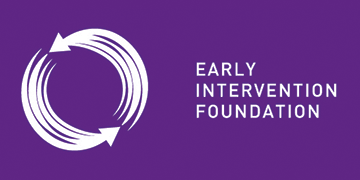Press release -
Early language development must be prioritised to close gap between children in low-income and better-off households
Press release: embargo for 00:01, Wednesday 27 September
New research published by the Early Intervention Foundation (EIF) highlights the impact of family economic circumstances and disadvantage on a child’s ability to learn all the skills of speech, language and communication. It calls for early language development to be prioritised as a child wellbeing indicator, on a par with vaccination, obesity and mental health.
Early language acquisition impacts on all aspects of young children’s non-physical development. It contributes to their ability to manage emotions and communicate feelings, to establish and maintain relationships, to think symbolically, and to learn to read and write. While the majority of young children acquire language effortlessly, a significant minority do not.
Multiple studies have shown that income-related gaps in children’s language are detectable by the age of 18 months, and often become bigger throughout children’s early development. The UK prevalence rate for early language difficulties is between 5% and 8% of all children, and over 20% for those growing up in low-income households.
The evidence suggests that children living in better-off families will hear many more words from their parents than less well-off children, and that their parents are more likely to use more complex language, to ask children more questions, and to engage in verbal activities such as sharing a book or playing rhyming games.
The impact of this gap persists: language capabilities at age 3 are predictive of language capabilities at age 9.
Income-related gaps continue to increase once children enter school, where the evidence shows that a child’s economic situation may have a greater impact on their language development than their ability to learn. Over the course of primary school, the language skills of better-off children catch up and surpass the skills of less well-off children who started with higher achievement scores.
By the end of secondary school, better-off children consistently complete more GCSEs and attain higher scores.
Because language and communication skills are so essential for school education and achievement, and future employment prospects, allowing less well-off children to fall behind in their language development risks undermining their life chances and perpetuating a cycle of disadvantage and poverty. The evidence shows that children with poor vocabulary skills at age 5 are more likely to have reading difficulties as an adult, more likely to have mental health problems, and more likely to be unemployed.
Dr Jo Casebourne, Chief Executive of EIF, says:
“Our research makes clear the consequences of failing to close these income-related gaps in language development: a whole group of children who will face unnecessary extra challenges in achieving good school results, entering employment, and maintaining good mental health into their adult lives. For this reason, supporting early language development should be put at the heart of any social mobility strategy.
“Crucially, the evidence shows that early intervention may be the most important of all: children whose home learning environment improves as they approach school age don’t see the same benefits as children who were receiving more stimulation and interaction at an earlier age. The first three years are critical – by the time a child starts school, the damage to their future prospects may already be done.”
To ensure children with language development problems do not fall through the cracks, EIF is calling for early language development to be prioritised as a child wellbeing indicator, so that it must be treated as a public health issue, like vaccination, obesity and mental health. This change would make it clear that language development problems have serious consequences and require additional support, even when they are not the result of acute or clinical disorders.
Dr Kirsten Asmussen, co-author of the paper and EIF expert on early child development, says:
“The income-related gap in children’s language development is not a new story. However, knowledge about the magnitude of this gap and ways of reducing it is. We believe that prioritising early language development as a national wellbeing indicator is a vital first step in putting this knowledge into action.”
To support this change, EIF also calls for:
- More testing of the effectiveness of interventions designed to support or improve children’s language development.
- Developing a shared terminology and criteria for identifying and describing language development problems, to enable effective monitoring and diagnosis, and a consistent response.
- Greater clarity from local authorities and schools on what they are offering to parents of children with language development problems.
*ENDS
References:
- The report is available at: http://www.eif.org.uk/publication/language-as-a-child-wellbeing-indicator/ (from 00:01 Wed 27 September). Copies are available in advance, on request.
Notes:
- The Early Intervention Foundation (EIF) is an independent charity that champions and supports the use of effective early intervention to improve the lives of children, young people and their families, reduce hardship and improve value for money in the long run. As a member of the What Works network, EIF is dedicated to expanding and communicating the evidence-base related to early intervention in the UK. For more information, see: http://www.eif.org.uk/
- The report is written by Professor James Law and Dr Jenna Charlton of Newcastle University in collaboration with Dr Kirsten Asmussen of EIF.
Contact:
Mark Ballinger
Head of Communications, EIF
E: mark.ballinger@eif.org.uk
T: 020 3542 2481 (switchboard)
Topics
- School
Categories
- social mobility
- language
- speech
- parents
- family
- children
